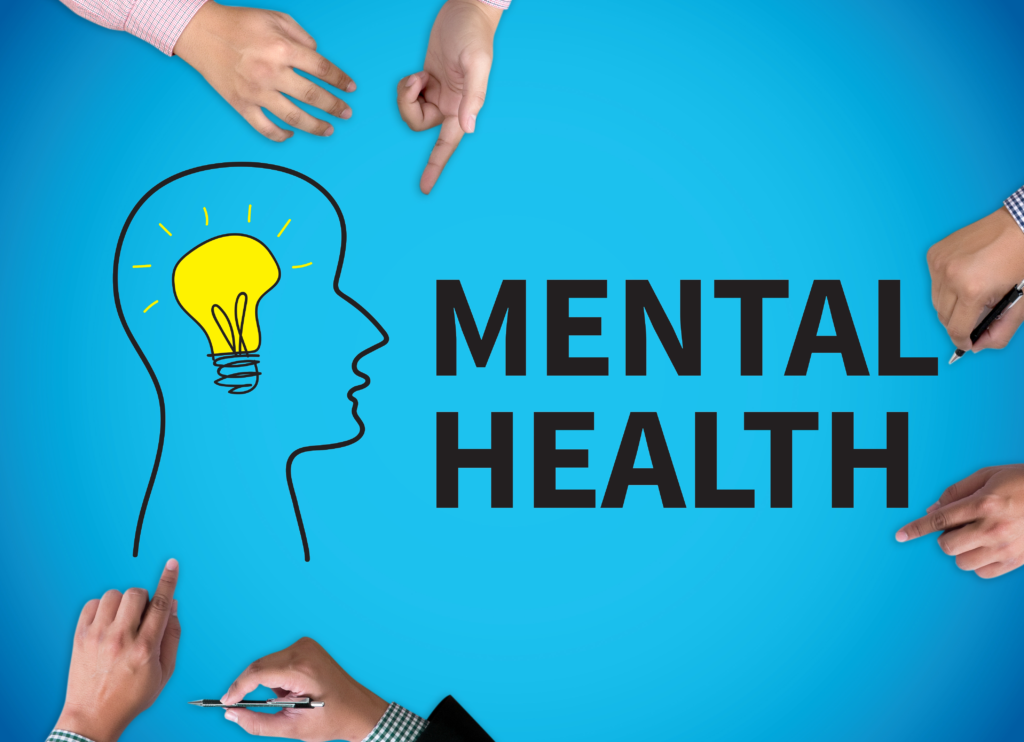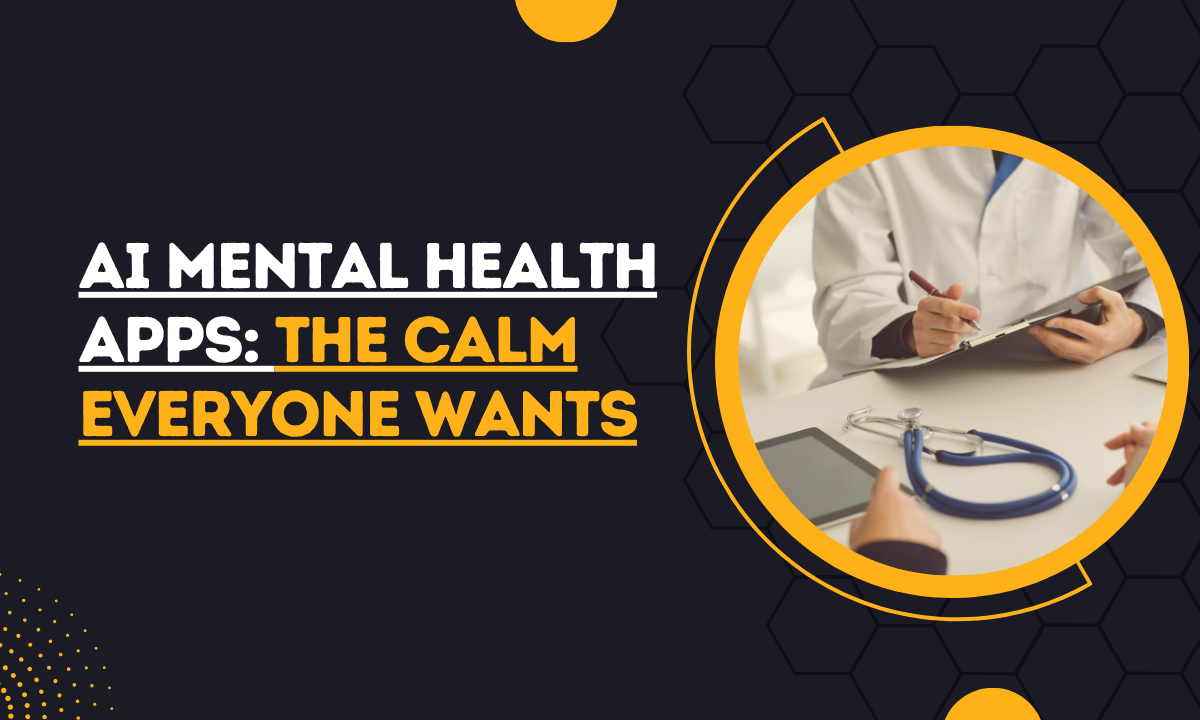AI Mental Health Apps: The Calm Everyone Wants
AI mental health apps for calm are quietly becoming the modern antidote to today’s emotional overload.
You’re likely feeling it too—the constant buzz of notifications, endless news cycles, and pressure to always stay “on.”
The result?
Rising anxiety, mental fatigue, and a growing inability to truly switch off.
But what if technology could offer more than distraction or productivity?
What if it could actually help you find calm?
That’s exactly what’s happening.
AI is no longer confined to corporate dashboards or customer service bots. It’s now stepping into a deeply personal space—your mental well-being.
In this article, we’ll explore how these apps work, why they’re gaining traction, and what to keep in mind when choosing one. Because calm isn’t a luxury anymore. It’s a need.
1. Why Everyone Is Craving Calm Today
The Age of Overstimulation
Ever find yourself endlessly scrolling through social media—only to feel worse than when you started?
You’re not alone.
Platforms designed for engagement have evolved into comparison machines.
Every swipe delivers a flood of curated success stories, beauty filters, and lifestyle goals.
The result? Chronic anxiety. A sense that you’re always behind.
It’s not just a digital problem. It’s a mental one.
The Lingering Mental Strain Post-Pandemic
The world may have opened up again, but your nervous system may not have gotten the memo.
According to the World Health Organization, global anxiety and depression levels spiked by 25% during the pandemic—and haven’t fully receded.

source: Astoria
Remote work blurred personal boundaries.
Constant health concerns took their toll.
And now, there’s a quiet burnout setting in.
That’s where technology is stepping in—but this time, as an ally.
A Rising Need for On-Demand Help
You may not always feel comfortable reaching out to a therapist.
Or maybe your schedule doesn’t allow it.
That’s where AI mental health apps for calm come in.
These tools aren’t a replacement for therapy—but they do offer something powerful: 24/7 access to emotional support, stress relief techniques, and personalized check-ins.
Whenever you need them.
Wherever you are.
And let’s be honest—calm isn’t optional anymore.
It’s essential.
According to Makeme Better.net “calm feels increasingly elusive, especially in hectic urban life. We’re surrounded by noise, pollution, and a relentless pace, with little connection to nature”.
So yes, the craving for calm is real.
The question is: What are you doing to meet it?
2. What Makes AI Mental Health Apps So Popular
Instant Support—No Judgment, Just Help
Ever wanted to talk to someone but didn’t know where to start?
AI mental health apps solve that hesitation.
They offer immediate, no-questions-asked support.
You can vent. You can reflect.
Or just breathe.
And you never have to worry about being judged.
That’s one reason they’re gaining ground.
You open an app—and it listens.
Personalized by Algorithms
Not all stress looks the same.
Yours may stem from overwork. Someone else’s, from social anxiety.
Here’s where AI steps up.
These apps track your mood patterns, offer custom journaling prompts, and even adapt their tone based on how you’re feeling.
One day it may suggest mindfulness.
Another day? A pep talk.
It’s smart care, tuned to your inner rhythms.
Round-the-Clock Availability
Let’s be real. Emotional strain doesn’t wait for an appointment. It hits at 2 AM, during meetings, or when you’re stuck in traffic.
That’s why 24/7 access matters.
With AI mental health apps for calm, you don’t need to book a session, wait a week, or sit in a waiting room.
Just open the app, and your space for clarity is already there.
So, what’s driving the popularity?
Simplicity. Accessibility. And timely relief.
These tools aren’t flashy distractions.
They’re fast-becoming emotional anchors—quietly rewriting how you take care of yourself in the digital age.
3. Top Features That Help You Regain Emotional Balance
Guided Mindfulness and Breathing
Feeling overwhelmed?
Sometimes, all it takes is 60 seconds of focused breathing to create a mental reset.
AI mental health apps now come equipped with voice-guided breathing sessions and mindfulness prompts.
These aren’t random.
They adjust based on your mood, stress levels, or time of day.
So instead of scrolling mindlessly, you get a few mindful minutes to center yourself.
Journaling That Knows You
Journaling works.
But staring at a blank page? Not so much.
These apps offer dynamic journaling prompts designed to gently guide your reflection.
Whether you’re tracking your mood or venting after a rough day, the AI nudges you toward insight.
And over time, you begin noticing patterns—the real triggers behind your stress.
Conversational AI—Text or Voice
Don’t want to talk to a human? Fair enough.
That’s where empathetic AI companions shine.
You can chat by text or speak out loud, and get calming, thoughtful replies in return.
It feels natural—like unloading to a really good listener who never interrupts.
CBT Tools That Fit Your Life
Cognitive Behavioral Therapy (CBT) is backed by decades of research.
But now, it fits in your pocket.
These apps give you CBT-based nudges: reframing negative thoughts, breaking worry loops, or suggesting action steps when you’re stuck.
It’s subtle, non-preachy, and incredibly effective.
Many AI mental health apps for calm integrate these features seamlessly, making emotional care both proactive and personal.
4. The Science Behind Their Success
How AI Understands Emotion
How does an app “get” how you’re feeling?
It’s not magic.
It’s data.
AI mental health apps analyze your behavior—how often you log in, your tone in messages, the choices you make during exercises.
Over time, they learn your emotional patterns.
The result?
More accurate suggestions tailored to your mood, even before you consciously notice a shift.
This constant feedback loop helps you stay one step ahead of emotional overwhelm.
The Power of Neuroplasticity
You’ve probably heard the phrase: what fires together, wires together.
Neuroscience backs this.
Repeatedly engaging in calming practices—like mindfulness, reframing thoughts, or deep breathing—reinforces healthy neural pathways.
The brain, thanks to neuroplasticity, begins to default to resilience rather than panic.
AI apps make it easier by prompting these small practices daily, without the pressure of perfection.
Digital Interventions That Actually Work
Is digital mental health just a trend?
Not according to research.
A 2023 meta-analysis published in JMIR Mental Health found that digital CBT programs significantly reduce symptoms of anxiety and depression.
Another study in Frontiers in Psychology confirmed that guided AI-based journaling improved emotional clarity and self-regulation.
This isn’t just theory.
It’s clinically relevant support—accessible, scalable, and effective.
So if you’re wondering why AI mental health apps for calm are gaining such traction, the answer lies in their ability to blend real science with real-time support.
They don’t just track your feelings—they train your brain to handle them better.
5. Caution: What AI Apps Can’t Replace
Empathy Needs More Than Code
Can an app truly feel what you’re going through?
While AI mental health apps for calm offer consistency and convenience, they’re still tools—not humans.
They can simulate empathy, but they can’t replicate the deeply intuitive understanding that a trained therapist provides during a tough session.
Real empathy requires presence, not programming.
You might get supportive prompts—but not the soulful silence or thoughtful eye contact that often heals more than words.
Serious Disorders Require Serious Care
It’s important to ask: are you dealing with mild stress—or something more?
If you’re struggling with chronic anxiety, deep depression, or trauma, AI apps may be helpful—but not sufficient.
Severe mental health conditions demand clinical attention.
Psychiatric evaluation, medication, or trauma-informed therapy fall outside what any app can safely or ethically provide.
That’s not a flaw in technology.
It’s just the line where human care becomes irreplaceable.
Connection Still Matters
When was the last time you sat across from someone who truly listened?
No matter how advanced algorithms get, they can’t hug you, hold space for your silence, or walk with you through real-life messiness.
Social connection—family dinners, deep conversations, spontaneous laughter—feeds parts of you that digital tools can’t touch.
So while AI tools are powerful aids, they’re not a complete substitute.
Use them as part of your toolkit—but don’t forget the irreplaceable strength of human relationships, community, and professional support.
6. Choosing the Right App for You
What’s Your Goal—Coaching, Calm, or Clarity?
Not all AI mental health apps are created equal.
The right one depends on what you need most right now.
Looking for emotional coaching?
Apps like Youper or Woebot provide CBT-based conversations to help reframe negative thoughts.
Want calming tools and gentle breathing guides?
MindFi or Wysa might be a better fit.
Prefer expressive outlets?
Replika adds a journaling-like layer to daily reflection with a personality that evolves with your input.
Ask yourself: Do I need to vent, be coached, or just slow down my racing thoughts?
AI Mental Health Apps for Calm
| App Name | Core Strength | Best For Users Who… |
|---|---|---|
| Replika | Evolving AI companion with journaling and chat features | Want emotional expression, journaling, and human-like conversation |
| Woebot | CBT-based interactive conversations | Need help reframing thoughts and managing mild anxiety or low mood |
| Youper | CBT + emotional coaching using short daily dialogues | Want structured, science-based coaching in small, manageable doses |
| Wysa | Guided CBT, mindfulness, and AI chat with therapist access | Prefer calm conversation with optional human support |
| MindFi | Mindfulness, breathing, focus tools, and mood tracking | Need short calming routines and productivity-enhancing exercises |
| Tide | Nature sounds, focus timers, breathing exercises | Prefer a calming environment and audio-based relaxation |
| Happify | Science-backed games and exercises to boost positivity | Enjoy gamified mood boosters and structured emotional activities |
Trial, Not Perfection
Don’t expect a perfect fit on the first try.
Try 2–3 apps for a week each. Observe how your mind and emotions respond.
Are you feeling more at ease? Sleeping better?
Less reactive?
Pay attention to the design too—is the interface calming or cluttered?
Do you feel heard by the chatbot, or does it feel scripted?
Your emotional comfort matters as much as the feature list.
Tech That Feels Like a Fit
The good news?
Most AI mental health apps for calm are free to try, and several offer premium upgrades later.
But for many, the basic versions are enough to create noticeable shifts in how they manage stress and anxiety.
There’s no universal best.
Just the one that clicks with your rhythm, your emotional tempo, and your inner world.
So explore. Tinker. Track the subtle changes. Let your experience guide you.
Related Posts
Sci-Fi Dreams Turned Reality: AI Based Mental Healthcare
AI is transforming mental health from futuristic fiction into daily support you can rely on.
Revolutionizing Healthcare with Digital Twin Technology
Digital twins are reshaping patient care by creating real-time, personalized health models.
Top 5 AI Apps for Mental Focus
Discover the best AI-powered tools designed to sharpen attention and reduce distractions.
You’re Losing Customers Without AI Personalization—Non-Techies, Act Now!
Without AI personalization, your business risks falling behind—even if you’re not tech-savvy.
Conclusion
AI mental health apps for calm are no longer optional tools—they’ve become essential companions in today’s fast-paced, emotionally demanding world.
The pursuit of peace isn’t a luxury anymore; it’s a baseline requirement for functioning well.
Whether you’re juggling responsibilities, managing anxiety, or just trying to stay centered amid digital chaos, these apps offer a quiet refuge.
What makes them powerful is their accessibility and personalization. You don’t have to wait for a crisis. You can start small. A few minutes of guided breathing. A mood check-in. A gentle nudge from an empathetic chatbot.
These subtle shifts add up. Over time, they help you build emotional clarity and resilience—without fanfare or friction.
So if you’ve been hesitating, now’s the time. Explore your options. Listen to your inner state. And remember: your calm isn’t somewhere out there to be found. It’s something you can build—starting today, with just one mindful click.

